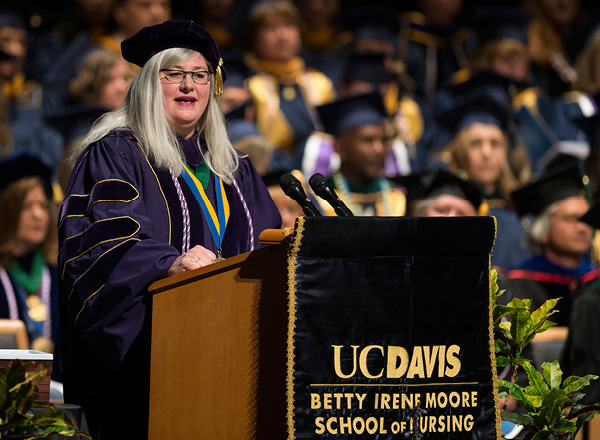
Associate Vice Chancellor and Dean’s Welcome
Partnerships drive innovation
What began as an aspiration in 2007, today is a thriving reality empowering a new generation of health leaders. The Betty Irene Moore School of Nursing at UC Davis was built upon one woman’s dream to improve the delivery of safe, quality health care by investing in those who deliver 95 percent of the care people receive. Betty Irene Moore (see page 19) recognized the potential power of nurses to improve health care and invested in that promise. Since 2010, when we admitted our first classes in master’s and doctoral degree programs, we have grown to a community of providers, scholars, policy advocates, researchers and change agents who advance health and ignite leadership through innovative education, transformative research and bold system change.
The Gordon and Betty Moore Foundation made the historically unprecedented decision to provide $100 million for the creation of this School of Nursing. The largest philanthropic contribution ever made to support nursing education illustrated the recognition that the faculty and graduates of the school can address barriers to population health and confront the challenges burdening health care in the United States. We consistently strive to assure that prevention and care put individuals, their families and their communities at the center of all we do.
We recognize our long-term success and sustainability require rigorous and effective research envisioned and implemented hand-in-hand with rigorous and effective education. We also appreciate the power that lies in those with whom we partner — community organizations, health care providers, policy makers and fellow scientists.
For this inaugural issue of our magazine, we display our roots, the core values that undergird our programs and anchor our vision: leadership development, interprofessional education, transformative research, cultural inclusiveness and innovative technology.
One expression of a commitment to positive change is Dr. Mary Lou de Leon Siantz, who serves as the UC Davis founding director of one of the most successful initiatives in this country to recruit, retain and promote highly qualified women who can diversify our scientific workforce. Diversity is critical to our ability to serve our communities with culturally relevant and inclusive care. Our faculty provide a telling tableau of heritage and diversity. Together, our 38 faculty cover 12 disciplines, a myriad of research interests, five racial and ethnic backgrounds and hail from six nations.
Ultimately, our role — as educators and lifelong learners — is to advance health in our community and to improve the lives of the people we serve. The tradition of providers simply telling people what they must and mustn’t do to be healthy is becoming a thing of the past. More and more, we approach wellness from another perspective, partnering with individuals and families, learning from community members about what they value and how they would like us to contribute, and co-creating a plan of action.
We partner with African-American pastors and volunteers and frail older adults in inner-city Oakland and with federally qualified health centers and their nurse-led health coaching initiatives to expand the capacity of medical assistants and health teams. We must develop, implement and evaluate approaches that provide the kinds of supports that caregivers actually need and, at the same time, build community capacity to support caregiving as an often invisible and commonly isolating contribution.
Our alumni leverage the tools and knowledge acquired and cultivated here to foster cultures of inquiry among California’s providers, lead strategic planning and paradigm-shifting initiatives at national organizations and develop tools to teach others not only about health, but also their implicit biases.
The power to transform health care lies in our partnerships. Our partnerships within UC Davis hold the potential for improving outcomes for millions of Californians and beyond. Collaborations with community organizations and national policy groups expand our reach and our impact, enable us to improve care for marginalized populations and offer robust opportunities for learning and growing. We are just beginning, but what a beginning this is and what a powerful future we are building — together.

Heather M. Young, Ph.D., R.N., F.A.A.N.
Dignity Health Dean’s Chair for Nursing Leadership
Associate Vice Chancellor for Nursing
Dean and Professor, Betty Irene Moore School of Nursing

